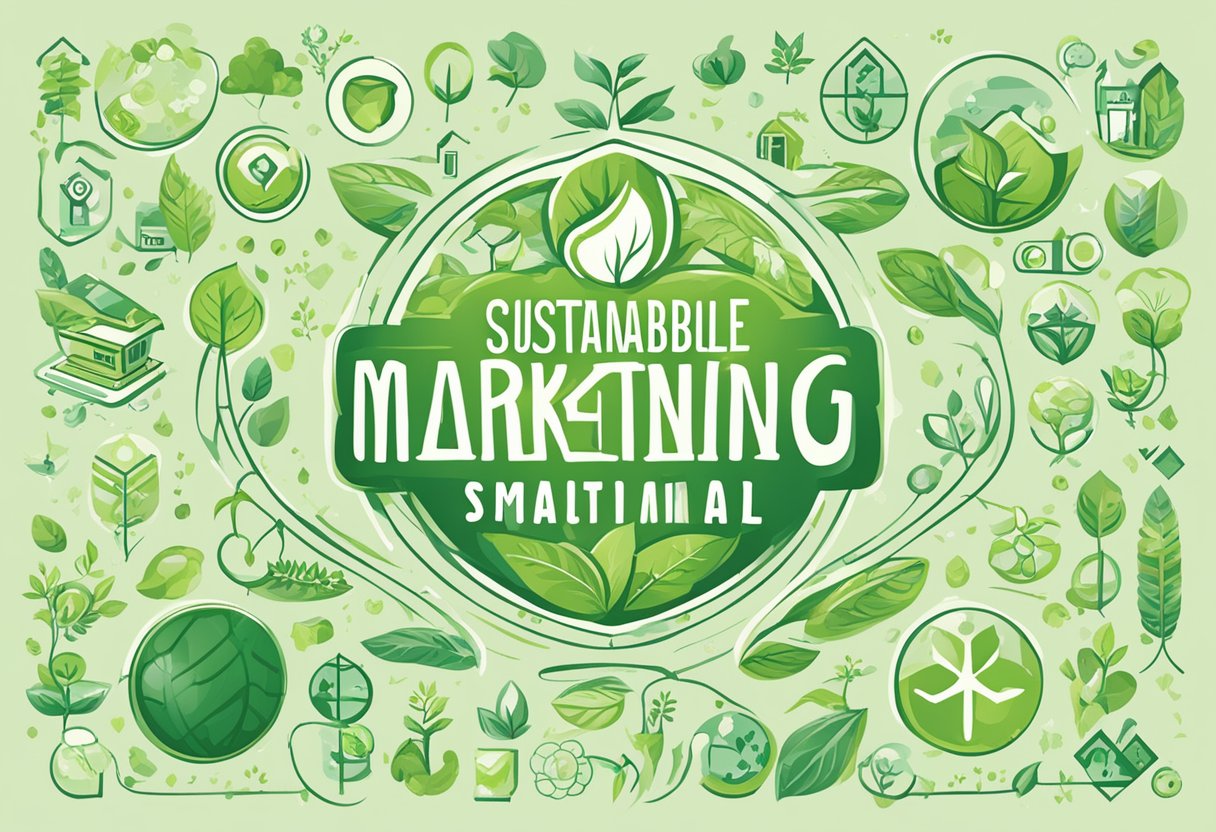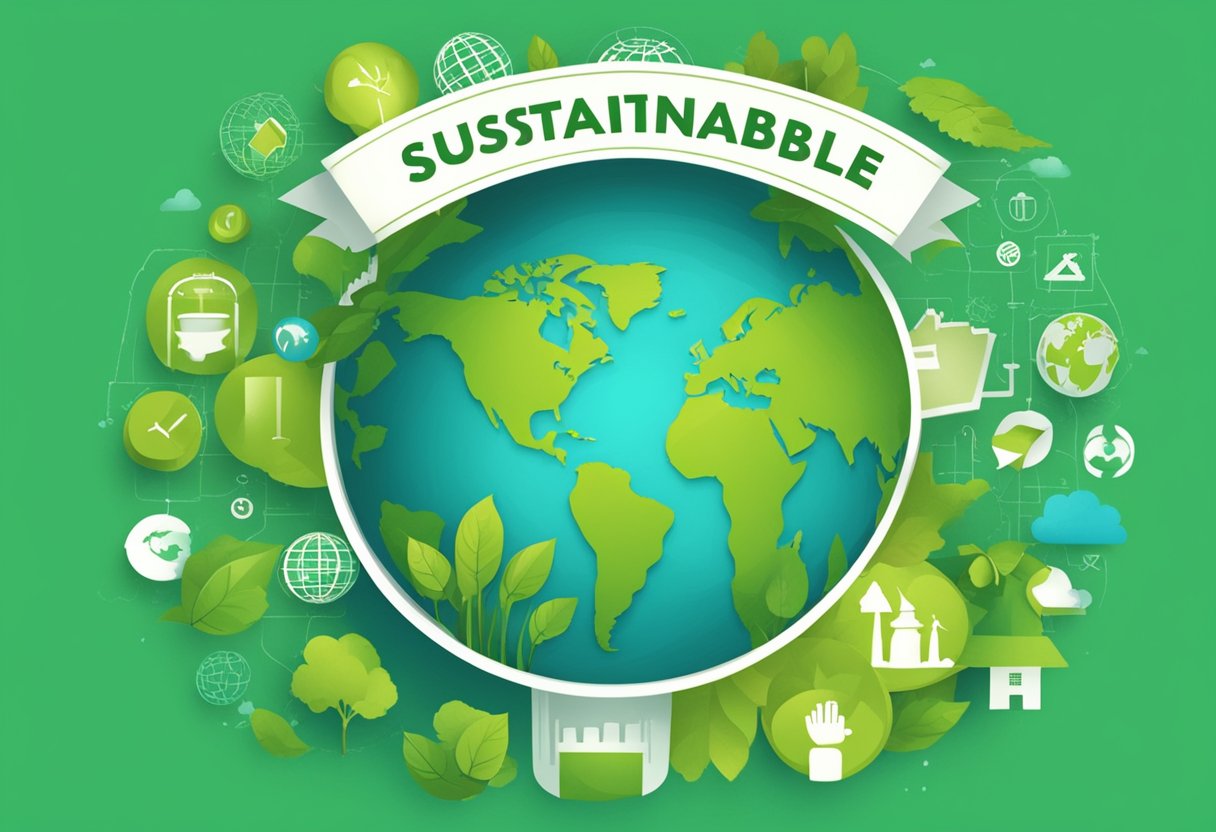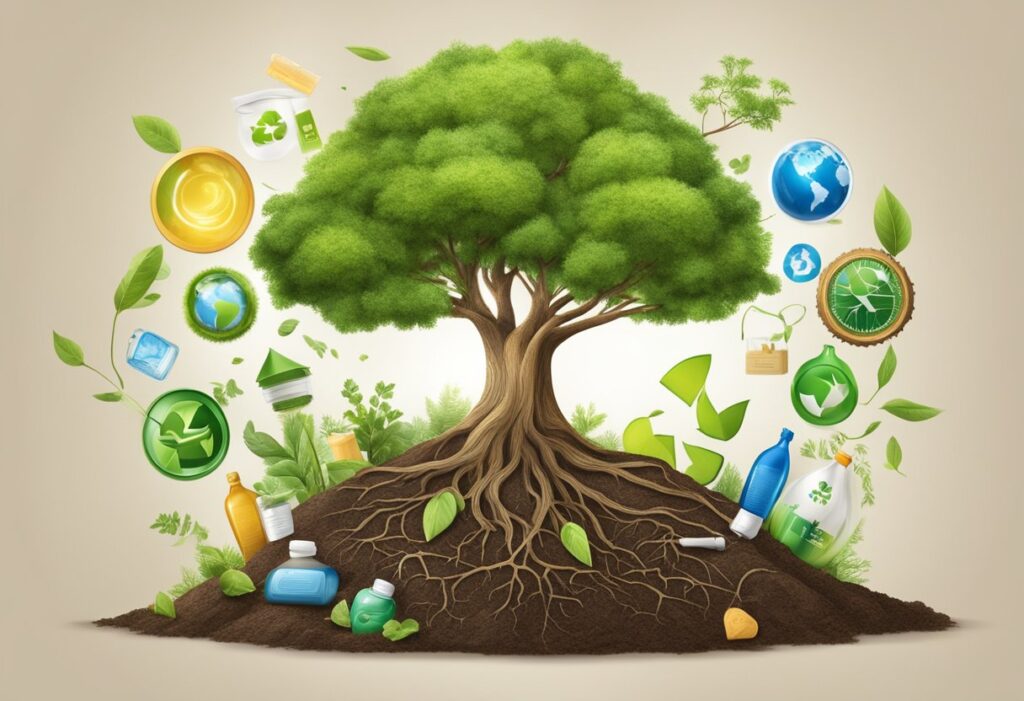Sustainable marketing is a term that has gained popularity in recent years, as companies and consumers alike become more aware of the need to protect the planet and its resources.
At its core, sustainable marketing is about creating and promoting products and services that have a positive impact on people and the planet, while also generating profits for companies. This approach involves taking into account the environmental, social, and economic aspects of sustainability throughout the entire marketing process, from product development to advertising and promotion.
Understanding sustainable marketing requires a deep understanding of sustainability as a concept.
Sustainability refers to the ability of a system or process to continue functioning over time, without depleting resources or causing harm to the environment.
In the context of marketing, sustainability means creating products and services that meet the needs of consumers while also minimizing negative impacts on the environment and society.
This can involve using eco-friendly materials, reducing waste and emissions, promoting fair labor practices, and supporting local communities.
Key Takeaways
- Sustainable marketing is about creating and promoting products and services that have a positive impact on people and the planet, while also generating profits for companies.
- Sustainability refers to the ability of a system or process to continue functioning over time, without depleting resources or causing harm to the environment.
- To achieve sustainable marketing, companies must take into account the environmental, social, and economic aspects of sustainability throughout the entire marketing process.
Understanding Sustainable Marketing

Sustainable marketing is a marketing approach that aims to promote products and services that are environmentally and socially responsible. It is a way for companies to show their commitment to sustainable practices and values, while also appealing to consumers who are increasingly concerned about the impact of their purchases on the planet.
Core Principles of Sustainable Marketing
The core principles of sustainable marketing include:
- Environmental Responsibility: Companies must take responsibility for the environmental impact of their products and services, and strive to minimize their carbon footprint and waste.
- Social Responsibility: Companies must also take responsibility for the social impact of their products and services, and ensure that they are produced in a way that is fair and ethical.
- Transparency: Companies must be transparent about their sustainability practices and make sure that their claims are backed up by evidence.
- Consumer Education: Companies must educate consumers about the environmental and social impact of their products and services, and encourage them to make more sustainable choices.
Difference Between Sustainable and Traditional Marketing
Traditional marketing is focused on promoting products and services to consumers, with little consideration for the environmental or social impact of those products.
Sustainable marketing, on the other hand, is focused on promoting products and services that are environmentally and socially responsible.
While traditional marketing may be effective in the short term, sustainable marketing is becoming increasingly important as consumers become more aware of the impact of their purchases on the planet.
Companies that embrace sustainable marketing are more likely to succeed in the long term, as they are better able to meet the needs of consumers who are looking for products and services that are both high quality and environmentally and socially responsible.
The Role of Companies in Sustainability

Corporate Social Responsibility
Corporate social responsibility (CSR) refers to a company’s voluntary actions to improve social and environmental conditions.
Companies that engage in sustainable marketing must also embrace CSR as a means of demonstrating their commitment to sustainability.
This includes taking steps to reduce their carbon footprint, conserving natural resources, and promoting social equity.
CSR initiatives can take many forms, including philanthropic donations, employee volunteerism, and community engagement.
Companies that prioritize CSR are often viewed more favorably by consumers, who are increasingly concerned about the social and environmental impact of the products they purchase.
Innovation in Sustainable Marketing
Innovation is crucial to the success of sustainable marketing.
Companies must continually seek out new ways to reduce their environmental impact and promote sustainable practices.
This includes developing products that are made from renewable materials, using energy-efficient manufacturing processes, and implementing sustainable supply chain practices.
Innovative sustainable marketing strategies can also help companies differentiate themselves from competitors and attract environmentally conscious consumers.
This can include using eco-friendly packaging, promoting recycling and waste reduction, and partnering with environmental organizations to promote sustainability.
Environmental Considerations

Reducing Carbon Footprint
Sustainable marketing is all about reducing the impact of marketing on the environment.
One of the most important ways to do this is by reducing carbon footprint.
Companies can reduce their carbon footprint by using renewable energy sources, such as solar or wind power, and by optimizing their supply chain.
By optimizing their supply chain, companies can reduce the amount of transportation required to move goods, which in turn reduces the amount of carbon emissions.
Waste Management and Recycling
Another important aspect of sustainable marketing is waste management and recycling.
Companies can reduce their environmental impact by reducing waste and recycling materials.
This can be achieved by using eco-friendly materials in packaging and by encouraging customers to recycle.
By using eco-friendly materials in packaging, companies can reduce the amount of waste that ends up in landfills. Encouraging customers to recycle can also help reduce waste and ensure that materials are reused instead of being discarded.
Consumer Behavior and Expectations

Conscious Consumerism
Consumer behavior has significantly changed in recent years, with a growing number of individuals becoming more conscious of their impact on the environment.
Conscious consumerism is a movement where consumers make purchasing decisions based on their values and beliefs, including environmental and social responsibility.
This has resulted in an increase in demand for eco-friendly products and services.
Consumers are more aware of the environmental impact of their choices and are actively seeking out products that are sustainable and environmentally friendly.
They are willing to pay a premium for products that align with their values and beliefs.
This trend has resulted in businesses adopting more sustainable practices and incorporating eco-friendly products into their offerings.
Demand for Eco-Friendly Products
The demand for eco-friendly products has grown significantly in recent years.
Consumers are looking for products that are made from sustainable materials, are recyclable, and have a lower carbon footprint.
Businesses that offer eco-friendly products are gaining a competitive advantage in the market and are better positioned to meet the needs of conscious consumers.
Marketing Strategies for Sustainability

Sustainable marketing is all about promoting products and services that are environmentally friendly, socially responsible, and economically viable.
To achieve this, businesses need to adopt marketing strategies that align with their sustainability goals. Here are some effective marketing strategies for sustainability:
Utilizing Digital Marketing
Digital marketing is a cost-effective way to reach a large audience and promote sustainable products and services.
Social media platforms, email marketing, and search engine optimization are all effective tools for promoting sustainability.
By leveraging digital marketing, businesses can communicate their sustainability efforts to a wider audience and attract environmentally conscious consumers.
Storytelling and Branding
Storytelling and branding are powerful tools for promoting sustainability.
By creating a brand that is synonymous with sustainability, businesses can differentiate themselves from their competitors and attract environmentally conscious consumers.
Storytelling is also an effective way to communicate a business’s sustainability efforts and connect with consumers on a deeper level.
To create a sustainable brand, businesses should focus on building a strong brand identity that aligns with their sustainability goals.
This includes developing a brand message that communicates the business’s commitment to sustainability and using sustainable materials in their packaging and marketing materials.
Transparency and Consumer Trust

Transparency is a key element of sustainable marketing.
Consumers today are more informed and concerned about the products they buy and the companies they support. They want to know where their products come from, how they are made, and the impact they have on the environment.
Therefore, it is crucial for companies to be transparent about their sustainability practices to build consumer trust.
Avoiding Greenwashing
Greenwashing is the act of making exaggerated or false claims about the environmental benefits of a product or service.
This can damage a company’s reputation and lead to a loss of consumer trust.
To avoid greenwashing, companies must be transparent about their sustainability practices and provide evidence to support their claims.
They should also avoid making vague or unsubstantiated claims.
Building Brand Reputation
Building a strong brand reputation is essential for sustainable marketing.
Companies must be authentic and transparent about their sustainability practices to build consumer trust and loyalty.
They should also communicate their sustainability efforts clearly and consistently across all channels.
This can include using eco-friendly packaging, reducing waste, and using renewable energy sources.
Social Impact and Responsibility

Sustainable marketing is not just about promoting products or services that are environmentally friendly. It also involves promoting social equity and taking responsibility for the social impact of business activities. In this section, we will explore how sustainable marketing can promote social responsibility and community engagement.
Promoting Social Equity
One of the key ways that sustainable marketing can promote social equity is by promoting socially responsible products. This means products that are produced in a way that is fair to workers, that do not exploit natural resources, and that are safe for consumers.
By promoting socially responsible products, companies can help to create a more just and equitable society.
Another way that sustainable marketing can promote social equity is by promoting diversity and inclusion. This means ensuring that all members of society have equal access to products and services, regardless of their race, gender, or socio-economic status.
By promoting diversity and inclusion, companies can help to break down barriers and create a more equitable society.
Community Engagement
Sustainable marketing also involves engaging with local communities and taking responsibility for the social impact of business activities.
This means working with local communities to identify their needs and concerns, and developing products and services that meet those needs.
One way that companies can engage with local communities is by supporting local initiatives and charities. This can involve donating money or resources, volunteering time, or providing expertise.
By supporting local initiatives and charities, companies can help to build stronger, more resilient communities.
Another way that companies can engage with local communities is by promoting sustainable practices.
This can involve encouraging customers to recycle, reducing waste and carbon emissions, and promoting sustainable lifestyles.
By promoting sustainable practices, companies can help to create a more sustainable future for everyone.
Sustainable Product Development

Sustainable product development is an essential aspect of sustainable marketing. It involves creating products that are eco-friendly, durable, and made from sustainable materials.
This section will discuss two critical components of sustainable product development: eco-friendly packaging and sustainable materials.
Eco-Friendly Packaging
Eco-friendly packaging is an integral part of sustainable product development. It involves using packaging materials that are recyclable, biodegradable, and made from sustainable resources.
Companies can reduce their environmental impact by using packaging materials that are eco-friendly.
One of the most popular eco-friendly packaging materials is paper. Paper is biodegradable, recyclable, and renewable.
Companies can use paper packaging for their products to reduce their carbon footprint.
Another option is to use biodegradable plastic packaging, which is made from plant-based materials and can decompose naturally.
Sustainable Materials
Sustainable materials are an essential aspect of sustainable product development. It involves using materials that are renewable, biodegradable, and have a low environmental impact.
Companies can reduce their environmental impact by using sustainable materials in their products.
One of the most popular sustainable materials is bamboo. Bamboo is a renewable resource that grows quickly and can be harvested without causing any damage to the environment.
It is also biodegradable, making it an excellent option for sustainable product development.
Another option is to use recycled materials, such as recycled plastic or paper, which can help reduce waste and conserve natural resources.
The Economic Aspect of Sustainability

Profitability and Growth
Sustainability is not just about environmental and social responsibility, but it is also about economic viability.
Sustainable marketing involves creating products and services that meet the needs of the present without compromising the ability of future generations to meet their own needs.
In other words, it is about creating long-term value for all stakeholders, including shareholders, customers, employees, and the society at large.
One of the key economic benefits of sustainability is increased profitability. Companies that adopt sustainable practices can reduce costs, increase efficiency, and improve their reputation, which can lead to increased sales and profits.
For example, by reducing waste and energy consumption, companies can save money on production costs and improve their bottom line.
Moreover, sustainable marketing can also drive growth by opening up new markets and creating new opportunities.
Consumers are increasingly demanding products that are environmentally friendly, socially responsible, and ethically sourced.
Companies that can meet these demands can gain a competitive advantage and tap into new markets.
Creating Long-Term Value
Sustainability is not just about short-term gains, but it is about creating long-term value for all stakeholders.
By adopting sustainable practices, companies can create a more resilient and adaptable business model that can withstand economic, social, and environmental challenges.
For example, by investing in renewable energy, companies can reduce their dependence on fossil fuels and protect themselves from volatile energy prices.
By investing in employee training and development, companies can improve productivity, reduce turnover, and build a more skilled and engaged workforce.
In addition, sustainable marketing can also help companies build stronger relationships with their customers and communities.
By demonstrating their commitment to sustainability, companies can build trust, loyalty, and goodwill, which can lead to increased brand value and customer satisfaction.
Leveraging Technology and Innovation

Adopting New Technologies
To stay relevant in today’s digital age, businesses must adopt new technologies that enable them to reach their target audience in an eco-friendly manner.
One such technology is the use of digital marketing channels, such as social media, email, and mobile apps, which have a lower carbon footprint compared to traditional marketing channels like print and TV ads.
Additionally, businesses can leverage tools like data analytics to gain insights into customer behavior and preferences, which can help them create more targeted and effective marketing campaigns.
Another technology that businesses can adopt is blockchain, which can help them track and verify the sustainability of their supply chain.
By using blockchain, businesses can ensure that their products are ethically sourced and produced, which can help them appeal to environmentally conscious consumers.
Sustainable Innovation
Innovation is key to achieving a sustainable future, and businesses must incorporate sustainability into their innovation processes.
One way to do this is by adopting a circular economy model, which involves designing products that can be reused, repaired, or recycled.
This can help businesses reduce waste and minimize their environmental impact.
Another way businesses can innovate sustainably is by using renewable energy sources, such as solar or wind power, to power their operations.
This not only reduces their carbon footprint but can also help them save money in the long run by reducing their energy costs.
Case Studies and Real-World Examples

Success Stories
One of the most prominent examples of sustainable marketing is Patagonia, a clothing company that has made environmental activism a core part of its brand identity.
In 2011, Patagonia launched its “Don’t Buy This Jacket” campaign, which encouraged customers to think twice before purchasing new clothing and to consider repairing or repurposing their existing clothes instead.
The campaign was a huge success, generating widespread media coverage and helping to establish Patagonia as a leader in sustainable fashion.
Another success story comes from the food sector, where companies like Chipotle and Whole Foods have built their brands around sustainable and ethical sourcing practices.
By emphasizing the importance of organic, locally sourced ingredients and humane animal treatment, these companies have attracted a loyal customer base that values sustainability and social responsibility.
Lessons Learned
While these success stories demonstrate the potential benefits of sustainable marketing, there are also lessons to be learned from less successful attempts.
One cautionary tale comes from the cosmetics industry, where companies like The Body Shop and Burt’s Bees have faced criticism for “greenwashing” – making exaggerated or false claims about their environmental credentials.
These companies have learned the hard way that consumers are increasingly savvy about sustainability issues and are quick to call out companies that are not living up to their promises.
Another lesson comes from the fashion industry, where fast fashion brands like H&M and Zara have come under fire for their unsustainable and exploitative practices.
These companies have struggled to reconcile their desire for rapid growth and low prices with the need to reduce their environmental impact and protect the rights of workers.
As consumers become more aware of these issues, they are demanding greater transparency and accountability from fashion companies.
Frequently Asked Questions

How do sustainable marketing practices differ from traditional marketing?
Sustainable marketing practices differ from traditional marketing in that they prioritize the long-term health and well-being of both the environment and society.
Rather than solely focusing on increasing profits and sales, sustainable marketing takes into consideration the impact of marketing activities on the planet and people.
This means that sustainable marketing campaigns are designed to minimize negative environmental and social impacts while still achieving business objectives.
Can you provide examples of successful sustainable marketing campaigns?
Yes, there are many successful sustainable marketing campaigns that have been implemented by companies around the world.
One example is Patagonia’s “Don’t Buy This Jacket” campaign, which encouraged customers to think twice before purchasing a new jacket and instead consider repairing their existing one.
Another example is Unilever’s “Project Sunlight,” which aimed to inspire people to live sustainably and take action to create a brighter future for children.
What are the core principles of a sustainable marketing strategy?
The core principles of a sustainable marketing strategy include minimizing negative environmental and social impacts, promoting transparency and accountability, and engaging with stakeholders to create shared value.
Sustainable marketing strategies also prioritize the well-being of future generations and aim to create long-term, sustainable solutions rather than short-term gains.
In what ways does sustainable marketing contribute to business growth?
Sustainable marketing can contribute to business growth in many ways, including by improving brand reputation, increasing customer loyalty, and reducing costs associated with negative environmental and social impacts.
Sustainable marketing can also help companies identify new market opportunities and create innovative products and services that meet the needs of environmentally and socially conscious consumers.
How does sustainable marketing align with corporate social responsibility?
Sustainable marketing aligns with corporate social responsibility by prioritizing the well-being of both the environment and society.
By implementing sustainable marketing practices, companies can demonstrate their commitment to creating positive social and environmental impacts, which is a key component of corporate social responsibility.
What distinguishes sustainable marketing from green marketing?
While green marketing focuses primarily on promoting environmentally friendly products and services, sustainable marketing takes a more holistic approach.
Sustainable marketing considers the social and economic impacts of marketing activities in addition to the environmental impacts. It also emphasizes long-term solutions rather than short-term gains.



